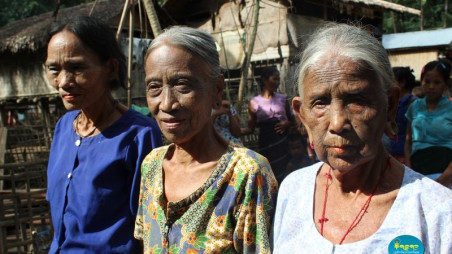Saif
Senior Member
- Joined
- Jan 24, 2024
- Messages
- 17,175
- Likes
- 8,204
- Nation

- Residence

- Axis Group


মিà§à¦¾à¦¨à¦®à¦¾à¦°à§ বিমান হামলাৠবাà¦à¦²à¦¾à¦¦à§à¦¶ সà§à¦®à¦¾à¦¨à§à¦¤à§ à¦à¦¤à¦à§à¦
বাà¦à¦²à¦¾à¦¦à§à¦¶-মিà§à¦¾à¦¨à¦®à¦¾à¦° সà§à¦®à¦¾à¦¨à§à¦¤à¦à§à¦à¦·à¦¾ রà§à¦¹à¦¿à¦à§à¦à¦¾ à¦à¦§à§à¦¯à§à¦·à¦¿à¦¤ রাà¦à¦¾à¦à¦¨ রাà¦à§à¦¯à§à¦° মà¦à¦¡à§à¦¤à§ সরà¦à¦¾à¦°à¦¿ বাহিনà§à¦° সà¦à§à¦à§ সশসà§à¦¤à§à¦° à¦à§à¦·à§à¦ ৠà¦à¦°à¦¾à¦à¦¾à¦¨ à¦à¦°à§à¦®à¦¿à¦°...
মিয়ানমারে বিমান হামলায় বাংলাদেশ সীমান্তে আতঙ্ক
Published :
Jun 28, 2024 17:06
Updated :
Jun 28, 2024 17:06

বাংলাদেশ-মিয়ানমার সীমান্তঘেঁষা রোহিঙ্গা অধ্যুষিত রাখাইন রাজ্যের মংডুতে সরকারি বাহিনীর সঙ্গে সশস্ত্র গোষ্ঠী আরাকান আর্মির তুমুল সংঘাত চলছে। গতকাল বৃহস্পতিবার ভোর থেকে শুরু হওয়া একের পর এক মর্টার শেল ও গোলার বিকট শব্দে এপারে কক্সবাজারের টেকনাফ সীমান্তের বাসিন্দাদের মাঝে আতঙ্ক বাড়ছে।
সীমান্তের বাসিন্দারা বলছেন, গত চার মাস ধরে নিজেদের অস্বিস্ত রক্ষায় মিয়ানমারের সরকারি বাহিনীর সঙ্গে আরাকান আর্মির সংঘাত চলছে। এতে ওপারের বেশ কিছু সীমান্ত চৌকি এখন বিদ্রোহী গোষ্ঠী আরকান আর্মির দখলে। ওপারের যুদ্ধের কারণে এপারে সীমান্তের টেকনাফের নাইট্যংপাড়া, কায়ুকখালীপাড়া, জালিয়াপাড়া, চৌধুরীপাড়া, উত্তরপাড়া, দক্ষিণপাড়া, কুলালপাড়া, খাংগার ডেইল, নাজিরপাড়া, মৌলভীপাড়া, সাবরাংয়ের মগপাড়া, আছারবনিয়া, ডেগিল্ল্যা বিল, নয়াপাড়া, শাহপরীর দ্বীপের জালিয়াপাড়ায় মর্টারশেল ও বোমার বিকট শব্দে বাড়ি-ঘর কাঁপছে।
আতঙ্কে রয়েছেন সীমান্ত এলাকাসহ পার্শ্ববর্তী এলাকার বাসিন্দারা।মিয়ানমারে তীব্র লড়াই চলছে। সকাল থেকে গ্রামখালি করতে মাইকিং করা হচ্ছে। লোকজন না সরায় যুদ্ধবিমান দিয়ে হামলা চালানো হচ্ছে। গইন্যা পাড়া ও গজ্জনিয়া পাড়াসহ কয়েকটি গ্রামে বিমান হামলা চালাচ্ছে জান্তা বাহিনী।

উখিয়া রোহিঙ্গা ক্যাম্পের বাসিন্দারা বলেন, 'বৃহস্পতিবার বিকালেও ওপারে মংডুতে যুদ্ধবিমানে হামলা চালানো হয়েছে। এতে হতাহতের খবর পাওয়া যাচ্ছে। সেখানে থাকা রোহিঙ্গারা প্রাণ বাঁচাতে এদিক-ওদিক ছুটছে। অনেকে আবার এপারে আসতে চেষ্টা চালাচ্ছে বলে শুনেছি'।
এদিকে, সীমান্তের ওপারে রাখাইনে চলমান সংঘাতের কারণে নতুন করে বাংলাদেশে যাতে রোহিঙ্গা অনুপ্রবেশ না ঘটে সেজন্য বাড়তি নিরাপত্তা ব্যবস্থা নিয়েছে বাংলাদেশ কোস্ট গার্ড এবং সীমান্তরক্ষী বর্ডার গার্ড বিজিবি।
টেকনাফ-২ বিজিবির অধিনায়ক লেফটেন্যান্ট কর্নেল মো. মহিউদ্দিন আহমেদ বলেন, মিয়ানমারের রাখাইনে গোলাগুলি চলছে। এ কারণে এপারে বিকট শব্দ পাওয়া যাচ্ছে। কিন্তু আমাদের সীমান্তবর্তী লোকজনের ভয়ের কোনও কারণ নেই। সীমান্তে বিজিবি কঠোর অবস্থানে রয়েছে। পাশাপাশি এ সমস্যাকে কেন্দ্র করে নতুন করে যাতে কোনও রোহিঙ্গা অনুপ্রবেশ ঘটতে না পারে সেজন্য সীমান্তে টহল জোরদার করা হয়েছে।
টেকনাফ উপজেলা নির্বাহী কর্মকর্তা (ইউএনও) মোহাম্মদ আদনান চৌধুরী বলেন, ওপারে সংঘাত বৃদ্ধি পাওয়ায় সীমান্তে নজরদারি বাড়ানো হয়েছে। মিয়ানমারে চলমান সংঘাতে সীমান্তে আইনশৃঙ্খলা বাহিনীগুলো সতর্ক অবস্থায় রয়েছে। গোলার শব্দে সীমান্তের মানুষরা যাতে নির্ভয়ে থাকেন, সেজন্য সীমান্তের বসবাসকারীদের খোঁজখবর রাখছি।
Published :
Jun 28, 2024 17:06
Updated :
Jun 28, 2024 17:06
বাংলাদেশ-মিয়ানমার সীমান্তঘেঁষা রোহিঙ্গা অধ্যুষিত রাখাইন রাজ্যের মংডুতে সরকারি বাহিনীর সঙ্গে সশস্ত্র গোষ্ঠী আরাকান আর্মির তুমুল সংঘাত চলছে। গতকাল বৃহস্পতিবার ভোর থেকে শুরু হওয়া একের পর এক মর্টার শেল ও গোলার বিকট শব্দে এপারে কক্সবাজারের টেকনাফ সীমান্তের বাসিন্দাদের মাঝে আতঙ্ক বাড়ছে।
সীমান্তের বাসিন্দারা বলছেন, গত চার মাস ধরে নিজেদের অস্বিস্ত রক্ষায় মিয়ানমারের সরকারি বাহিনীর সঙ্গে আরাকান আর্মির সংঘাত চলছে। এতে ওপারের বেশ কিছু সীমান্ত চৌকি এখন বিদ্রোহী গোষ্ঠী আরকান আর্মির দখলে। ওপারের যুদ্ধের কারণে এপারে সীমান্তের টেকনাফের নাইট্যংপাড়া, কায়ুকখালীপাড়া, জালিয়াপাড়া, চৌধুরীপাড়া, উত্তরপাড়া, দক্ষিণপাড়া, কুলালপাড়া, খাংগার ডেইল, নাজিরপাড়া, মৌলভীপাড়া, সাবরাংয়ের মগপাড়া, আছারবনিয়া, ডেগিল্ল্যা বিল, নয়াপাড়া, শাহপরীর দ্বীপের জালিয়াপাড়ায় মর্টারশেল ও বোমার বিকট শব্দে বাড়ি-ঘর কাঁপছে।
আতঙ্কে রয়েছেন সীমান্ত এলাকাসহ পার্শ্ববর্তী এলাকার বাসিন্দারা।মিয়ানমারে তীব্র লড়াই চলছে। সকাল থেকে গ্রামখালি করতে মাইকিং করা হচ্ছে। লোকজন না সরায় যুদ্ধবিমান দিয়ে হামলা চালানো হচ্ছে। গইন্যা পাড়া ও গজ্জনিয়া পাড়াসহ কয়েকটি গ্রামে বিমান হামলা চালাচ্ছে জান্তা বাহিনী।
উখিয়া রোহিঙ্গা ক্যাম্পের বাসিন্দারা বলেন, 'বৃহস্পতিবার বিকালেও ওপারে মংডুতে যুদ্ধবিমানে হামলা চালানো হয়েছে। এতে হতাহতের খবর পাওয়া যাচ্ছে। সেখানে থাকা রোহিঙ্গারা প্রাণ বাঁচাতে এদিক-ওদিক ছুটছে। অনেকে আবার এপারে আসতে চেষ্টা চালাচ্ছে বলে শুনেছি'।
এদিকে, সীমান্তের ওপারে রাখাইনে চলমান সংঘাতের কারণে নতুন করে বাংলাদেশে যাতে রোহিঙ্গা অনুপ্রবেশ না ঘটে সেজন্য বাড়তি নিরাপত্তা ব্যবস্থা নিয়েছে বাংলাদেশ কোস্ট গার্ড এবং সীমান্তরক্ষী বর্ডার গার্ড বিজিবি।
টেকনাফ-২ বিজিবির অধিনায়ক লেফটেন্যান্ট কর্নেল মো. মহিউদ্দিন আহমেদ বলেন, মিয়ানমারের রাখাইনে গোলাগুলি চলছে। এ কারণে এপারে বিকট শব্দ পাওয়া যাচ্ছে। কিন্তু আমাদের সীমান্তবর্তী লোকজনের ভয়ের কোনও কারণ নেই। সীমান্তে বিজিবি কঠোর অবস্থানে রয়েছে। পাশাপাশি এ সমস্যাকে কেন্দ্র করে নতুন করে যাতে কোনও রোহিঙ্গা অনুপ্রবেশ ঘটতে না পারে সেজন্য সীমান্তে টহল জোরদার করা হয়েছে।
টেকনাফ উপজেলা নির্বাহী কর্মকর্তা (ইউএনও) মোহাম্মদ আদনান চৌধুরী বলেন, ওপারে সংঘাত বৃদ্ধি পাওয়ায় সীমান্তে নজরদারি বাড়ানো হয়েছে। মিয়ানমারে চলমান সংঘাতে সীমান্তে আইনশৃঙ্খলা বাহিনীগুলো সতর্ক অবস্থায় রয়েছে। গোলার শব্দে সীমান্তের মানুষরা যাতে নির্ভয়ে থাকেন, সেজন্য সীমান্তের বসবাসকারীদের খোঁজখবর রাখছি।








































